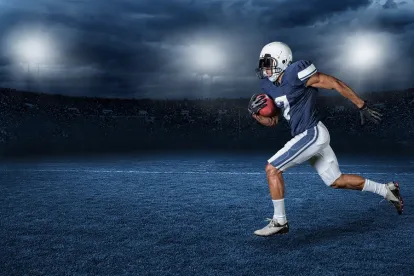College athletes across the country are now able to make money off the use of their name, image, and likeness (NIL). This is true for athletes regardless of whether they are located in a state that has passed NIL legislation.
On June 30, 2021, the NCAA Board of Governors approved an interim NIL policy that allows college athletes to earn compensation from use of their NIL and to engage with companies and agents that manage NIL activities. However, athletes are required to report any NIL activities to their respective schools, which are in turn required to ensure compliance with any applicable state laws. College athletes in states without NIL laws are generally free to engage in NIL activities without violating NCAA rules. However, the NCAA has kept in place prohibitions on pay-for-play arrangements and restrictions on NIL compensation related to recruiting.
The interim policy is a strategic move for the NCAA. On June 21, 2021, the U.S. Supreme Court in the case of NCAA v. Alston ruled that NCAA restrictions on schools paying education-related expenses of student-athletes violated antitrust laws. While the Alston decision is not directly related to college athletes’ NIL rights, it was Justice Kavanaugh’s concurring opinion stating that the NCAA rules restricting student-athletes from receiving compensation or benefits from their colleges for playing sports – presumably including those restricting NIL compensation – “also raise serious questions under the antitrust laws” that drew the most attention. By enacting this interim policy, the NCAA appears to be trying to alleviate the concern of competitive advantage among schools in states with NIL laws versus schools in those states that do not have such laws. Additionally, the interim policy buys the NCAA time to shift its focus to getting some form of federal legislation passed.
Whether a federal NIL bill can actually be passed remains to be seen, however. To be sure, some members of Congress have expressed support for a federal NIL bill. For example, on June 29, 2021, Sen. Mitch McConnell stated that a federal NIL bill is “probably necessary” and that the NCAA needs to “give us a plan that we can enact on the federal level.” But several federal NIL bills have already been introduced in both the House and the Senate without success, reflecting that there is substantial disagreement on what exactly should be included.
If and when federal NIL legislation is enacted, additional issues are sure to arise. Many states’ NIL laws go into effect today, and it will likely be months before a federal bill is passed. During that time, college athletes will execute contracts for use of their NIL under the NCAA interim policy and/or their respective states’ laws. What impact, if any, federal legislation would have on these contracts remains to be seen. Monitoring forthcoming changes and how those changes may impact current deals will be critical for anyone dealing in the college athlete NIL market.
How did this all start?
In September 2019, California was the first state to pass legislation that would allow college athletes to earn compensation from use of their NIL, but not until January 1, 2023. The passing of the California law put the NCAA on notice that it would need to enact some form of NIL rules and started a domino effect of other such laws being passed in other states.
However, with the California law not taking effect until 2023, the NCAA and other states had time to formulate plans, policies, and legislation. It was not until June 12, 2020, when Florida passed its own NIL legislation with a start date of July 1, 2021, that the race to deal with NIL really began. To date, 24 states have passed NIL laws with 13 of them set to take effect in July 2021.
States with NIL laws effective July 2021:
-
Alabama
-
Arizona
-
Florida
-
Georgia
-
Illinois
-
Kentucky
-
Mississippi
-
Nebraska
-
New Mexico
-
Ohio
-
Oregon
-
Pennsylvania
-
Texas
States with NIL laws effective in 2022:
-
Arkansas
-
Michigan
-
Nevada
-
South Carolina
-
Tennessee
States with NIL laws effective 2023 or later:
-
California
-
Colorado
-
Maryland
-
Montana
-
New Jersey
-
Oklahoma
With the NCAA interim policy and several states having their own NIL laws, any potential contracts or endorsements will have to be tailored to comply with the relevant state’s laws and any applicable NCAA rules. This becomes particularly important in states, such as Alabama, that impose criminal liability for violations of their NIL laws. The recent changes to college athlete transfer rules present additional challenges for those in the college athlete NIL space. Could a college athlete carry a contract from one school to another school in a different state? Some state NIL laws say “no,” but if the athlete entered the contract in a state without NIL laws or is transferring into a state without NIL laws, the issue becomes more complicated.
Regardless, the landscape of college sports is now irrevocably changed. And those changes are sure to continue. What form any future changes will take, be it in the form of federal legislation or NCAA rules, remains uncertain. What is certain is that it will be important for anyone involved with college athlete NIL deals to be current on the varying laws and rules.




 />i
/>i

